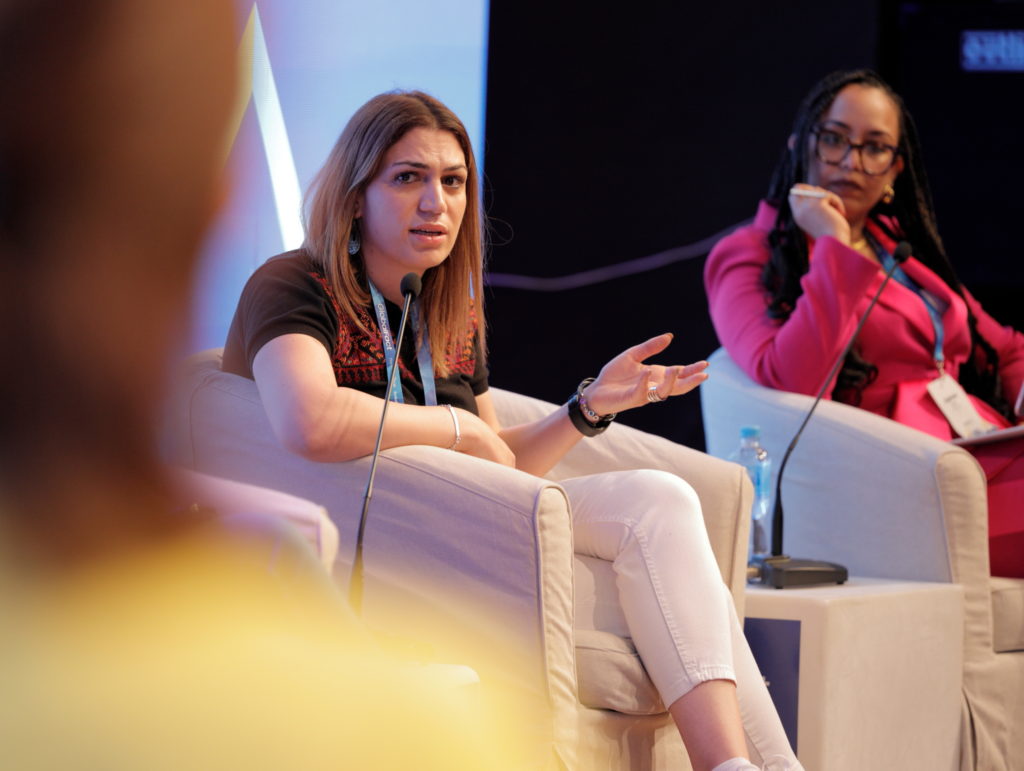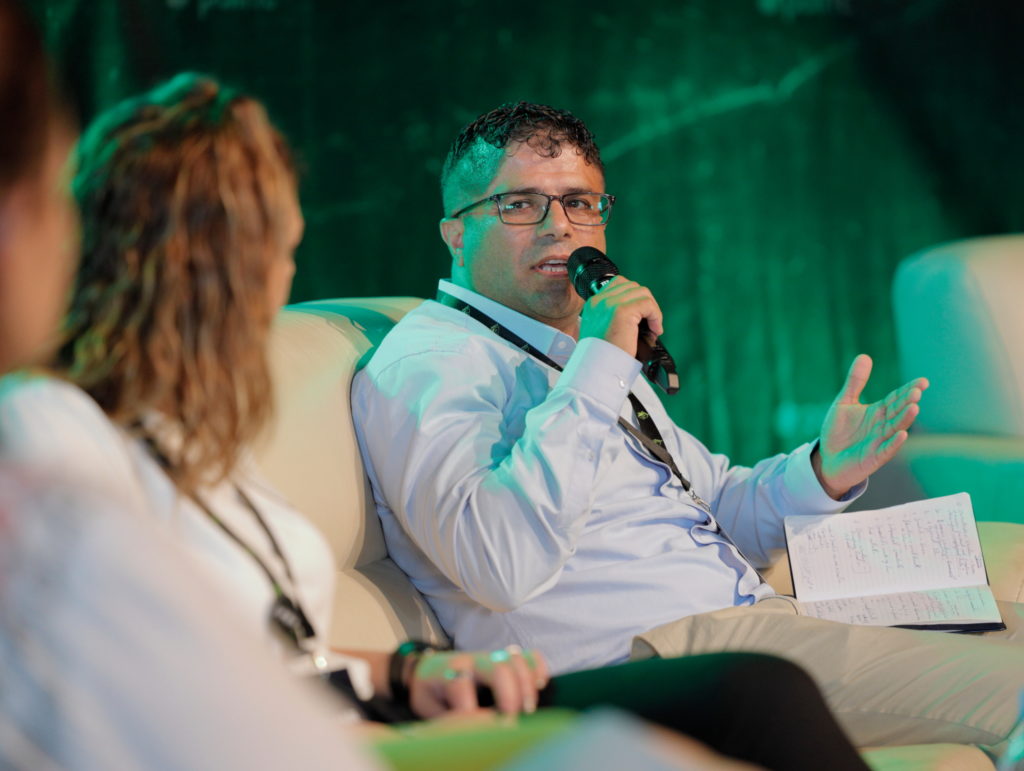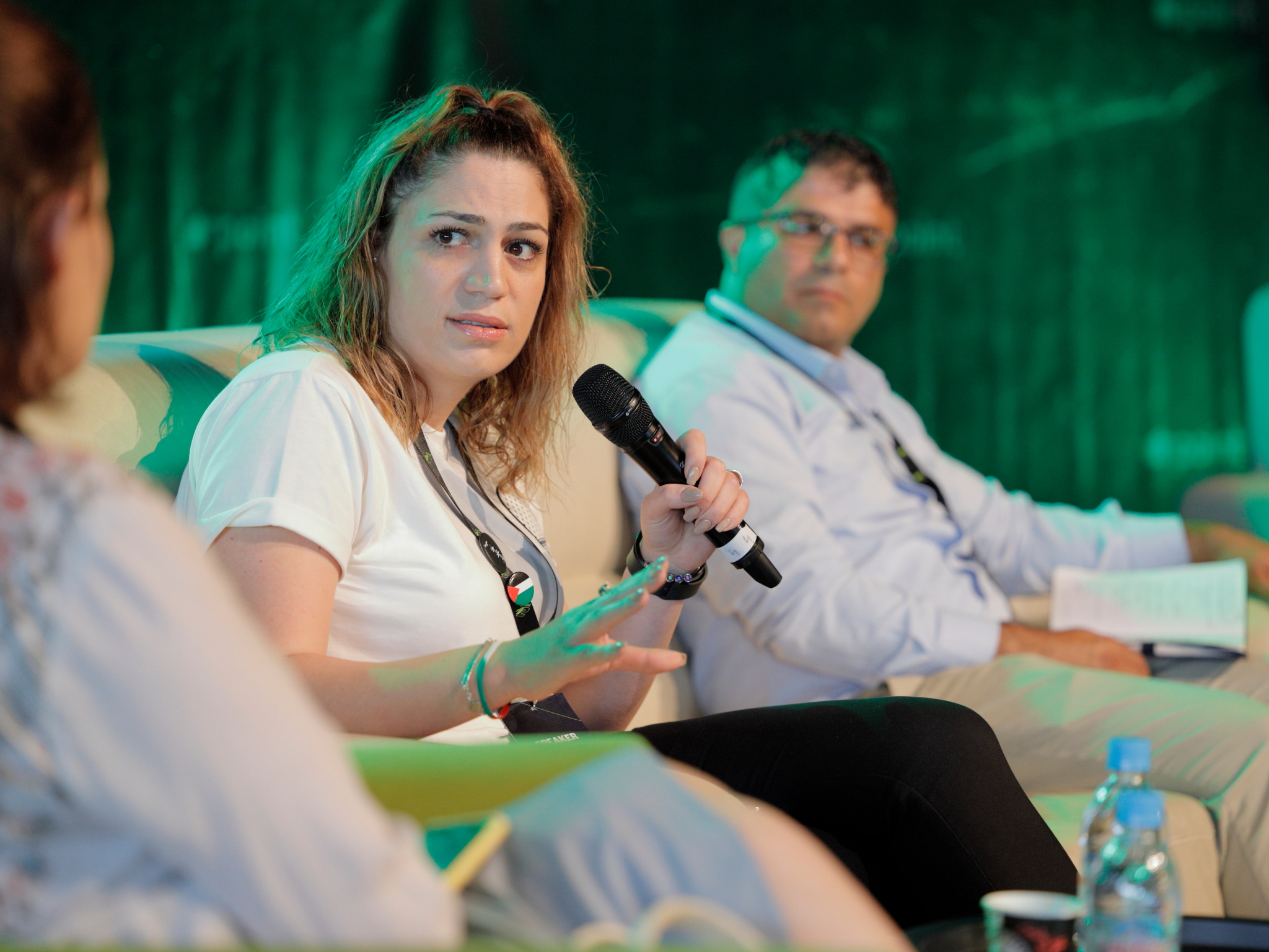At the end of June, Sarajevo, the capital of Bosnia, hosted two significant gatherings of professionals in media, fact-checking, technology, and political accountability: the Point Conference, organized annually in Sarajevo by the Citizens Association Why Not, and the Global Fact Conference, held each year at various locations worldwide. Among the over 500 media professionals in attendance were two Palestinian journalists from the West Bank, Riham Abu Aita and Khaled Faqeeh, who shared their insights on the conditions faced by journalists in Palestine and discussed pressing issues in global journalism related to Palestine with a journalist from SEE Check.
Riham Abu Aita, a seasoned fact-checker and communications expert, co-founded Kashif, a Palestinian platform dedicated to media literacy and fact-checking. With a piercing, resolute gaze and larger-than-life energy, Abu Aita seems like a woman with a mission. With over a decade in the field, she was well qualified to note the dual standards prevalent in international media coverage of Palestine and Israel. “Large outlets like BBC, CNN show a double standard. When Palestinians are killed, they shy away from naming Israelis as perpetrators in headlines,” Riham expressed, pointing out the disparities in how the narratives are framed.
Her critique extended beyond mere reporting inaccuracies; it touched on the ethical lapses in humanizing subjects. “For the international media, we are just numbers. But when reporting on Israelis, their lives are detailed with empathy. They talk about their families, their jobs,” she noted. This selective sensitivity, according to Abu Aita, contributes to misleading the public—a subtle yet pervasive form of misinformation.
A quiet yet determined presence, Khaled Faqeeh, steering the executive team at Wattan Media Group, has spent over two decades advocating for the rights of marginalized groups in Palestine. His work includes training young media professionals and promoting transparency and accountability in governance.
The conflict did not start on October 7, 2023, Faqeeh seemed adamant to emphasize. “The Western media often shortens the Palestinian narrative, ignoring our prolonged history of occupation since 1948,” he pointed out. His experience underscores the challenges Palestinian journalists face, from a lack of legal protections to barriers imposed by military occupation.
“We live in a very difficult country and political community,” he said, mentioning that there are no Freedom of Information Access Laws they could use, nor policies that would protect journalists not only from the Israeli occupation but also local authorities.
Media’s Role and Responsibilities
Both journalists agreed that the battle for an unbiased narrative is uphill but essential. Abu Aita and Faqeeh shared specific instances where global media failed to verify sensational claims when it concerned Palestinians. They mentioned the unverified claim that Hamas beheaded 40 babies, published by most global media outlets. The Israeli narrative is trusted by default, they agreed, while the Palestinian numbers, incidents, and lost lives are being meticulously checked.
“It’s about politics within media organizations,” Abu Aita elucidated, emphasizing the influence of political agendas on journalistic integrity. “In European countries and in the USA, many people don’t truly understand what’s happening in Palestine—unless they come and see it with their own eyes. This is because they rely on their local media, which often only presents the narratives it chooses to promote,” said Abu Aita.

However, the game is changing with social media, she said. Journalists from Gaza are effectively communicating the realities on the ground, even though they paid a high price for it. Many of these journalists have amassed millions of followers, though this popularity comes under unfortunate circumstances due to the ongoing conflict. Their coverage is garnering increasing international interest, bringing more attention to the Palestinian situation from people across Europe and other regions. And their reporting has an added value.
“Journalists and activists, social media activists in Gaza, have done an amazing job documenting crimes for the International Criminal Court. Even though it hasn’t worked to end the war, I am sure that their documentation will make a difference in the future,” said Abu Aita.
However, this was not without a cost. Many journalists in Gaza have lost their lives, families, or were detained. The Committee to Protect Journalists reports that as of August 7, 2024, 113 journalists and media workers were confirmed killed: 108 Palestinian, two Israeli, and three Lebanese, while 32 journalists were reported injured. Two journalists were reported missing, 52 journalists were reported arrested, and there were reports of multiple assaults, threats, cyberattacks, censorship, and killings of family members.
As we discussed the evolving role of social media, it became clear that even though platforms like Facebook and Instagram could be a good way to circumvent the traditional media, they also have their shortcomings. Although these platforms offer Palestinian journalists a chance to narrate their stories directly to a global audience, they also pose challenges like shadow bans and algorithmic biases that limit their reach, Abu Aita and Faqeeh claim.
“For Kashif, the reach on our Instagram stories is minimal, often just between 100 to 200 views. Same for Facebook. It’s as if we’re speaking to ourselves. Our TikTok account was banned just two weeks after the war began. Watan faces the same issues; despite having millions of followers on their Facebook page, the interaction is almost nonexistent,” said Abu Aita. Despite challenges, they find ways to go around them, using tactics such as writing in codes and playing with images. “We just focus on the humanitarian need for Gazans,” said Faqeeh, noting that such content makes it through.
SEE Check reported on the accusations of shadow bans of pro-Palestine content on social media in our December 2023 article.
Reflecting on Similarities with Bosnia
It seemed fitting that we spoke in Sarajevo, a city in which the scars of the last war are still visible, both materially, on the facades of the buildings, and in politics, in a political system some deem the most complex in the world and the “fragile peace” marred by constant threats of a new conflict.
Faqeeh drew parallels between the Palestinian experience and the Bosnian context, particularly relating to the recognition and denial of historical suffering. “Just as Bosnia has faced denial of its genocide, we in Palestine are fighting against the denial of our ongoing oppression,” he shared. Even though Bosnian citizens often complain of the Dayton Peace Agreement and its implications to the current political and social situation in the country, it looks different from the Palestinian angle.
“I admit I feel jealous of your situation. While you may not be fully satisfied with the Dayton Agreement, at least it has provided you with 30 years of peace. It’s significant that you have a peace agreement in place that has lasted for three decades”, Faqeeh noted.

“Palestinians are looking for this, they want peace. But they want a peace that protects their humanity, their land, their living, and provides a future for their children. This is how we look to the Bosnian example,” he added.
The insights from Riham Abu Aita and Khaled Faqeeh at the Sarajevo conferences highlight the critical role of media in conflict zones. Their call for ethical journalism and accurate representation resonates deeply, echoing across the professional echelons of global journalism and the corridors of power alike. They also underscore the importance of individual responsibility and the power citizens have through social networks to combat apathy and desensitization.
“Don’t stop posting,” said Abu Aita. “Do not get used to the scenes you’re seeing in Gaza.”
This interview has been edited for length and clarity.



